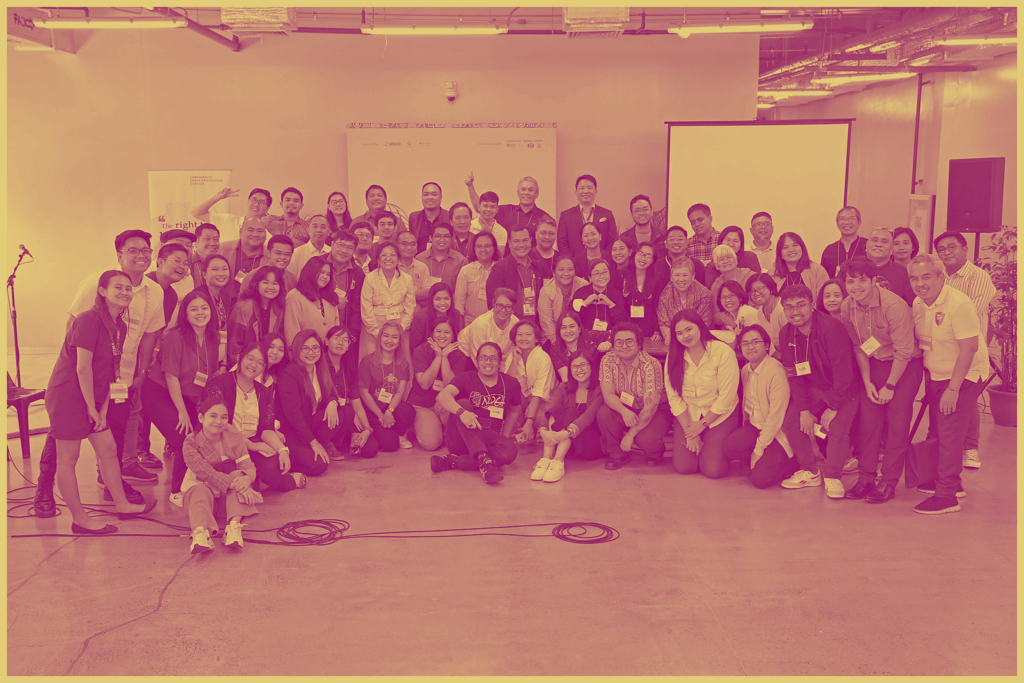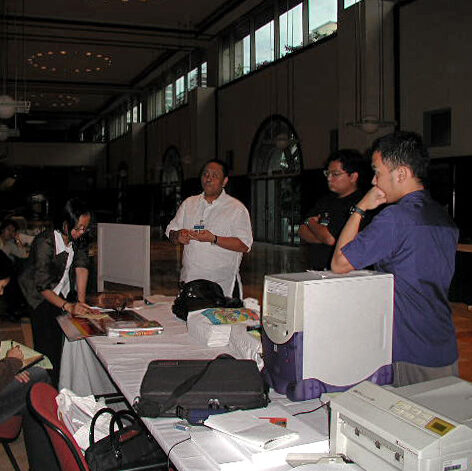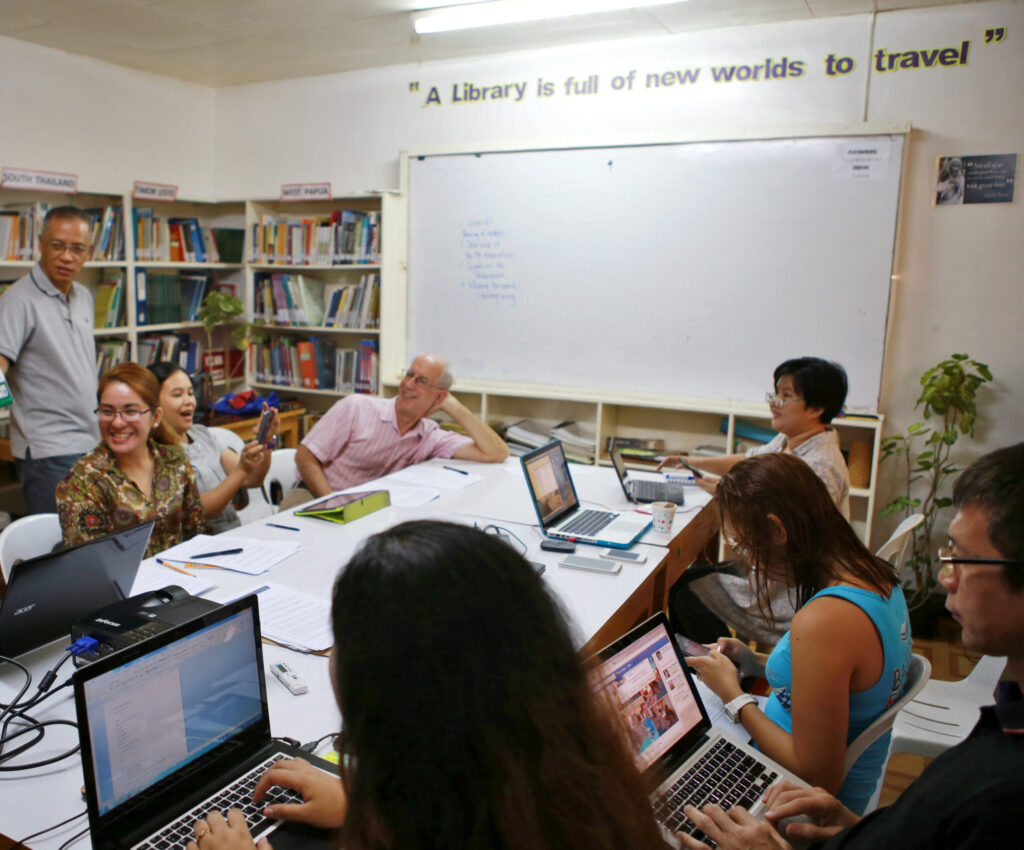
HISTORY
Promoting digital rights in the Philippines and beyond since 1987
Founded in May 1987, FMA initially provided media support to the RPN 9’s public affairs program Street Pulse, but later engaged in special projects such as the Katipunan Centennial or Philippine Sovereignty Project in 1992.
Five years later, FMA gathered data and information on the US bases for the historic Senate vote in 1992. The organization also helped CSOs, NGOs, and POs (among them the Sumilao farmers) with their communication needs using tri-media until 1995.


By 1997, new media, ICT, and the common computer started to be accepted by the people. In partnership with the PLDT Foundation, FMA together with CODE-NGO, worked to help CSOs, NGOs, and POs address their digital divide concerns through PLDT’s Countrywide Development – Wide Area Network or CODE-WAN project. The project initially focused on generating user development, raising public awareness on email, and providing user support through help desks. The second phase involved helping eight CSOs, NGOS, and POs (Salidumay, HR Now, Balangay, Anihan, Balay, Asia Caucus, Peace/Never Again, and People’s PoW-ER) come up with their community websites.
FMA also established a telecenter to address community access needs with DOST-PCHRD in Agusan del Sur and Agusan del Norte in the late 1990s.
However, change in leadership in PLDT and eventually in FMA diminished funding support from PLDT in the same time. In 1998, FMA conducted a series of roundtable discussions (RTDs) on “Computers Challenge Civil Society: Forging Strategic Information and Communications Agenda for NGOs” which included regional consultations until 2000. With its CODE-WAN savings, FMA also conducted the “ICT Needs And Capacities Survey” with some 300 NGO respondents. The survey enabled FMA to reassess its direction for the future. The survey was also FMA’s first research-oriented activity.

NEW DIRECTIONS
From connectivity issues and content development for websites, to content development for policy advocacies, FMA engaged not only in pro-active and responsive policy research on ICT but also convened and led CSOs on ICT policy advocacies. At this time, FMA also updated its capacity building efforts on two levels: (1) literacy, and (2) more advanced and specific training.
In 2000, FMA was invited to become the CSO representative in the government’s Information Technology and E-Commerce Council (ITECC), the first time it has partnered with the government. During the same year, FMA was invited and participated in the Institute of Philippine Culture (IPC) of the Ateneo de Manila University (ADMU) project “Partnership in People-Centered Health,” that aimed to define a set of principles and strategies for “resourcing public health (RPH)” and helping stakeholders operationalize such in various countries.
FMA set up a mailing list and website, provided technical assistance, and served as the help desk for the project, which resulted in the formation of the Bahaginan at Ugnayan sa Kalusugan or BUKAL working group. (An assessment of the IPC project was done from November 2004 to March 2005.)
FMA also became the technical consultant and documenter for the QU4RAD Network project of IPC with four other international universities, assisting stakeholders to improve on management of medicines through communications, learning, and experimentation through ICT.
In 2001, FMA again figured in the political scene with its Erapalis.net project, in the context of the emerging role of ICT for development and activism.
FMA also undertook research for the Asia-Pacific Philanthropy Network (APPIN) on a Philippine NGO database, the outputs of which were uploaded at the Philippine country tab of the Asia Pacific Philanthropy Consortium: www.asiaphilanthropy.org. FMA also conducted another study on NGO databases with CODE-NGO and Asia Foundation (AF) in 2001.
FMA joined and became the 5th Asian member of the Association for Progressive Communications (APC) by 2001. This paved the way for its formal recognition in the regional and international arena. FMA enhanced its policy engagement, particularly on the Internet Rights Program for Asia, through its involvement in the APC-sponsored First Asian Internet Rights Conference in South Korea in 2001.
GENDER, ICT AND EXPANDED ENGAGEMENT
It was also in 2001 where FMA exposed itself to gender and ICT issues when it handled the data gathering phase of Isis International Manila’s gender research. FMA later also got involved with the Gender Evaluation Methodology (GEM) project of APC’s Women’s Program.
FMA further enhanced its strategic regional network when it participated and convened the Asian CSOs in the Preparatory Committee meeting (PrepCom1) of the World Summit on Information Society (WSIS) in Geneva in July 2002.
In 2003, FMA set up the Asia Pacific NGO Coordination Committee for WSIS (AP-NGO-CCW) in the WSIS Asian Regional Meeting in Tokyo, co-sponsored a round table discussion on “Constricting Cyberspace: Internet Rights After 9/11” in Manila, and participated in the discussions initiated by the Women’s Hub (a co-member of APC) towards establishing a gender and ICT policy monitor.
FMA then conducted a second round table discussion series on “Policy, Praxis, and Public Interest: Strategic Issues in the Philippine Information Society,” launched through its first public forum on “The pH Dilemma: A Way Forward: Policy Issues in the Administration of the Philippine Internet Domain Name,” which brought major stakeholders together.
FMA, through its then-executive director Al Alegre, was again invited to join the Philippine delegation for PrepCom3 also in 2003. By November 2003, FMA held a national level workshop to harmonize the global WSIS outputs with concrete national action plans, and presented them to the Geneva Summit sponsored by the United Nations Development Plan (UNDP.)FMA also put up the Knowledge Networking for Empowerment and Development: A Southeast Asian Workshop in March 2003, funded through the World Bank Small Grants Programme and Asian Development Bank. This was after being part of the steering committee in Asia of the Knowledge Sharing/ Management for Development.
STRENGTHENING LOCAL ICT POLICY
FMA also partnered with The Asia Foundation (TAF) in its Marthus Project where it helped strengthen the capacity of the Commission on Human Rights (CHR) and the domestic rights community to generate, accept and transmit reports on human rights violations through a secured network database system or Marthus software. FMA produced monographs for the project until 2004.
In March 2004, FMA was commissioned by APC to develop the National ICT Policy Website for the Philippines, which served as a tool to monitor ICT activities, follow-up actions, and other policy outcomes in the country. This was further expanded in 2005.
In May 2004, FMA became a catalyst and CSO convener of the Philippine Summit on the Information Society (PSIS) sponsored by the Commission on Information on Communications Technology (CICT.) It was the Asian convener of the 1st regional workshop on communications rights, titled “Communications Rights: Asian Solidarity Towards a Regional Agenda for Articulation and Action,” from 4-6 August 2004 in Manila. It produced a communications rights primer and advocacy video and held parallel sessions at the Second Asian Civil Society Forum in Bangkok in November 2004.
In June 2005, FMA wrote a paper on Communications Rights in the Philippines for the Communications Rights in the Information Society Campaign (CRIS Campaign) on September 2005. FMA handled the content and information used by the Working Group on Internet Governance (WGIG) during the national PSIS workshop in Manila.
From January to September 2006, FMA developed monographs on the digital divide in the Philippines for the Pan Asia Networking (PAN) Project. An email list – digitaldivide-res@fma.ph was created for online discussions on such issues. The first draft of the research was presented at the Ateneo de Manila University in September 2006.
By July to November 2006, FMA increased civil society participation in the ICT Roadmap Development where small grants were provided through the UNDP Manila Office. Workshops on the road map were conducted with CICT and other stakeholders and documented in the PAN Project monographs.
In 2007-2008, FMA conducted the ONI project which focused on conducting a preliminary survey on censorship and surveillance practice in the area of mobile telephony among five (5) Asian countries (Cambodia, Bangladesh, Pakistan, Philippines, and South Korea.) FMA took care of the Philippine survey.
From 2009 to 2010, FMA focused on three major projects, namely the (1) MDG3 Take Back The Tech or TBTT Project on Gender and ICT; (2) Open eGovernance Indicators or OeGI that involved surveys and research on four countries (Philippines, Hong Kong (China), Pakistan, and Thailand); and (3) the Privacy Rights Advocacy Project that included perception surveys on privacy rights, a Philippine Privacy Rights Monitoring Report, and four policy issue papers on privacy rights in the Philippines.
PROTECTING DIGITAL RIGHTS
Today, FMA’s programs center on (1) gender and ICT, (2) privacy and data protection, and (3) internet rights.Thus, from providing media support to a TV public affairs program (Street Pulse) to advancing tri-media advocacies by peoples’ organizations in Sumilao, Bukidnon in 1987 to 1994, to helping CSOs, NGOs, and POs address digital divide issues at the advent of ICT in 1997, to becoming a government partner in 1999 and regionally recognized by 2001 as a member of the Association for Progressive Communications (APC), and now an active policy researcher on privacy rights, gender and ICT, and internet rights, FMA has gone a long way not only in the Philippines, but more so in the regional (Asian) and international arena, in democratizing human rights in this new digital age.